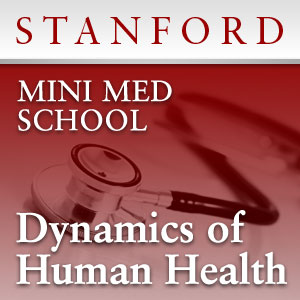Mini Med School: Dynamics of Human Health
Subscribed: 9Played: 38
Subscribe
Description
Stanford Continuing Studies is proud to present the Stanford Mini Med School, a series arranged and directed by Stanford’s School of Medicine. Featuring more than thirty distinguished faculty, scientists, and physicians from Stanford’s prestigious medical school, this series of courses will offer students a dynamic introduction to the world of human biology, health and disease, and the groundbreaking changes taking place in medical research and health care.
The fall quarter course will get started with a journey inside human biology. We will start by familiarizing ourselves with the world of very small things. We will take a close look at DNA, stem cells, and microbes, and see how these and other small players form the building blocks of the human body. This will allow us to understand how human organs develop (and can also regenerate), how our nervous and immune systems work, and how diseases can afflict us. From there, the course will move beyond the individual and take a more global view of health. How do pandemics take shape? How does the environment affect our collective health? And how can we finally implement a healthcare system that makes sense for our nation? Various experts from the Stanford School of Medicine will address these and other big picture questions during the first course in the Stanford Mini Med School.
Released with a Creative Commons BY-NC-ND license.
The fall quarter course will get started with a journey inside human biology. We will start by familiarizing ourselves with the world of very small things. We will take a close look at DNA, stem cells, and microbes, and see how these and other small players form the building blocks of the human body. This will allow us to understand how human organs develop (and can also regenerate), how our nervous and immune systems work, and how diseases can afflict us. From there, the course will move beyond the individual and take a more global view of health. How do pandemics take shape? How does the environment affect our collective health? And how can we finally implement a healthcare system that makes sense for our nation? Various experts from the Stanford School of Medicine will address these and other big picture questions during the first course in the Stanford Mini Med School.
Released with a Creative Commons BY-NC-ND license.
10 Episodes
Reverse
Comments






